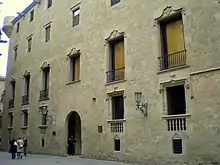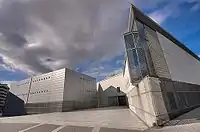General Archive of the Crown of Aragon
The General Archive of the Crown of Aragon (Catalan: Arxiu General de la Corona d'Aragó), originally Royal Archives of Barcelona (Catalan: Arxiu Reial de Barcelona), is an archive containing the background documents of the institutions of the former Crown of Aragon and currently also contains other historical resources.


Since 1994 it has been based on the street Almogàvers of Barcelona, where it was transferred from the Palau del Lloctinent (Lieutenant Palace).
It was founded in 1318 in Barcelona by the king James II of Aragon the Just as the unified archive of all the territories of the Crown of Aragon. It was the single central archive of the Crown from 1318-1348, in which the Courts of Zaragoza created the Archive of the Kingdom of Aragon. In 1419 the Royal Archives of Valencia where also created, which is where the funds of the courts of economic control of the administration of the kingdom and the Rational Master File of the Kingdom of Valencia were deposited .
After the War of the Spanish Succession (1701 - 1714), Javier Garma(1740 - 1783) was appointed head of archive. He attempted to create an authentic Archive of the Crown of Aragon by gathering in the Royal Archives of Barcelona all funds of the royal administration of the territories of the former Crown of Aragon. The Garma project inspired the policy of Prosper Bofarull and Mascaro, chief of the archive between 1814 and 1849, and creator of the current General Archive of the Crown of Aragon.
From 1318 until 1993, the archive was headquartered in Palau del Lloctinent part of Palau Reial Major (the Royal Palace in Barcelona), and from that date it was partly transferred to Almogàvers building, so it now has two locations: the historical palace for protocol events, exhibitions and courses, and the newer location for research and curation.
On January 20, 2007 was created the Board of Trustees[1] (Catalan: Patronat de l'Arxiu de la Corona d'Aragó, Spanish: Patronato del Archivo de la Corona de Aragón) in the Lieutenant Palace in Barcelona, by the presidents of Catalonia, José Montilla, Aragon Marcelino Iglesias, of Valencia Francisco Camps and the Balearic Islands Jaume Matas, and the Minister of Culture Carmen Calvo.
History
Precedents
.jpg.webp)
Precedents for the archive are collections of scrolls from the clerk's office of the first Counts of Barcelona and Kings of Aragon. Is mentioned for the first time a king's archive in October 25, 1180. In 1194 King Alfonso II of Aragon commissioned the compilation of the documents from the royal archive that were legally valid and could be useful for the rights of the Crown to Ramon de Caldes (jurist), Dean of the Cathedral of Barcelona and jurist. The result was the Liber feudorum maior. Ramon de Caldes himself said that the file was in ordinatione confused. With this compilation we know of more than one thousand documents, the oldest of the 9th century.
These early mentions does not mean that there is still a sorted archive but had cataloged several scrolls that could be geographically dispersed, and usually do not take these statements as a precedent for the current archive. The first mention of a real document depot is in 1255. This depot was located at the monastery of Santa Maria de Sixena, then located in the geographic center of the Crown.
The reign of James I of Aragon increased the use of paper, which increased the rate of production of documents and marks the beginning of the record of the royal chancery .
Notes
Further reading
- Francisco Rodríguez Marín, ed. (1916). "Archivo General de la Corona de Aragón". Guia histórica y descriptiva de los archivos, bibliotecas y museos arqueológicos de España (in Spanish). Madrid: Tipografia de la Revista de archivos, bibliotecas y museos. pp. 469+. hdl:2027/mdp.39015039247625.
External links
| Wikimedia Commons has media related to General Archive of the Crown of Aragon. |
- General Archive of the Crown of Aragon (in English)